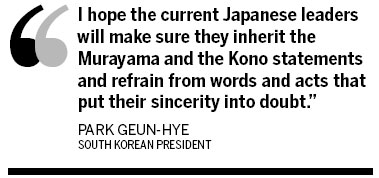Park urges Japan to acknowledge history
Seoul tells Tokyo to honor apologies made for World War II misdeeds
South Korean President Park Geun-hye publicly urged the Japanese Cabinet to show that it understands history correctly and to honor apologies made by former Japanese leaders for the country's World War II misdeeds.
Park made the comments in a response to Japanese Prime Minister Shinzo Abe's Dec 26 visit to the controversial Yasukuni Shrine, which enraged both China and South Korea and has drawn worldwide condemnation.
"I hope the current Japanese leaders will make sure they inherit the Murayama and the Kono statements and refrain from words and acts that put their sincerity into doubt," she said in an interview with CNN, according to the official website of Cheong Wa Dae, the presidential residence, on Tuesday.
The Japanese prime minister in 1995, Tomiichi Murayama, made a statement at that time about the country's self-reflection, and made apologies for its war history. And in 1993, Yohei Kono, then the Japanese chief cabinet secretary, made a statement officially acknowledging the Japanese military's forcing of women from the Korean Peninsula and China to be sex slaves.
"We were able to move forward with Korea's relationship with Japan over the years because Japanese political leaders have clearly stated through the Murayama as well as the Kono statement their correct understanding of history," Park said.
Whether or not a Japanese leader honors the spirit of the two landmark statements has become a major benchmark by which Japan's Asian neighbors assess the country's officials.
Shi Yuanhua, director of the Center for Korean Studies under the Institute of International Studies of Fudan University in Shanghai, said Abe's visit has increased tension in Northeast Asia, and both Beijing and Seoul will continue to criticize Abe on the historical issue.
"Abe has made up his mind about countering China and serving as a keen pioneer of the US' rebalancing strategy in the Asia-Pacific," Shi said. "But the Park administration is different. It will continue to seek a great relationship with both Beijing and Washington."
Immediately after Abe's visit to the Shrine - which many consider to be a symbol of Japan's unrepentant militarism with its salute to 14 high-level war criminals - Beijing and Seoul made strong statements of objection, and even Washington conveyed a rare "disappointment".
On Dec 30, Park obliquely criticized Japan for "digging up wounds of the past" without mentioning the country by name.
To make things worse, Abe's predecessor - former prime minister Yoshihiko Noda, publicly described Park Geun-hye as a "tattletale schoolgirl", something the Korea Times characterized as "not only committing a most glaring case of diplomatic rudeness but revealing his low-level, gender-based discrimination".
"It seems as if Japanese leaders, in or out of power, were vying hard to ride on nationalistic sentiments of their ultra-rightist supporters," the newspaper said.
Alongside the historical issues, Tokyo's relationship with Seoul was often overshadowed by the dispute over a chain of small islands located between the two, known as the Dokdo in South Korea and Takeshima in Japan.
But South Korea's role is also complicated "because the US-South Korea alliance is a cornerstone of Seoul's diplomacy, while Japan is another diehard ally of the US", said Feng Wei, a professor of Japanese studies at Fudan.
Nobuo Kishi, Abe's younger brother and Japan's vice-foreign minister is now visiting the US for damage control.
"We would like them to, obviously, take each other into consideration, and we want our allies to get along well," said US Congressman Steve Chabot after meeting with Kishi on Monday. Chabot is chairman of the Subcommittee on Asia and the Pacific of the US House Committee on Foreign Affairs.
Xinhua contributed to this story.
zhangyunbi@chinadaily.com.cn
|
Former "comfort women" Kil Un-ock (bottom left) and Kim Bock-dong (bottom right), who were forced to serve Japanese troops as sex slaves during World War II, participate in a rally to commemorate the 22nd anniversary of the "Wednesday protest against Japanese government policy" in front of the Japanese Embassy in Seoul on Jan 8. Ahn Young-joon / Associated Press |

(China Daily 01/15/2014 page11)















